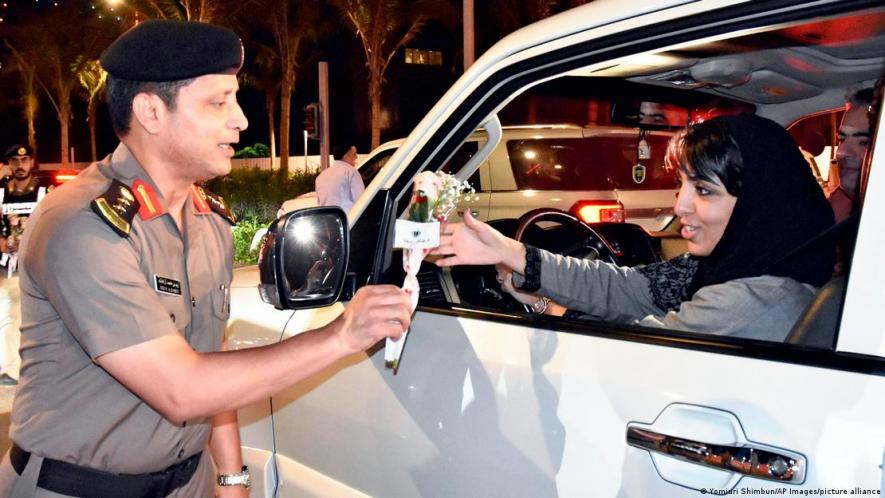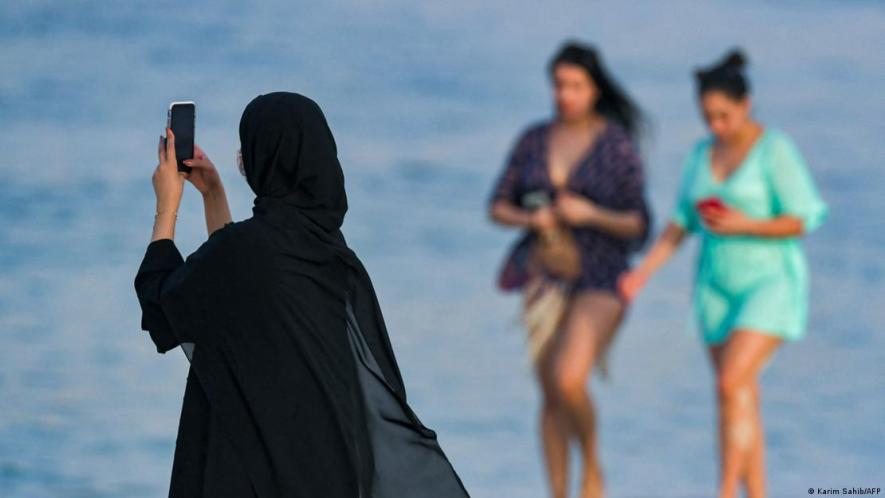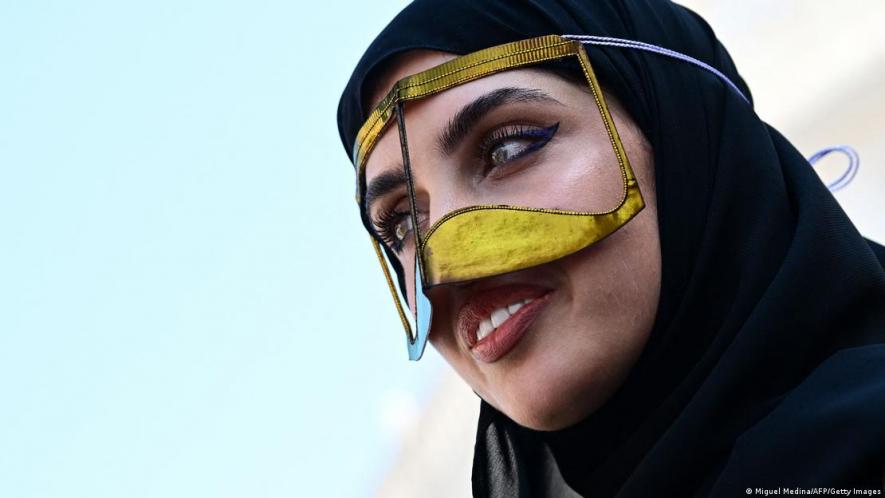Women's Rights in the Gulf: Progress, But Still a Way to Go

In many ways, 2022 wasn't a bad year for women in the Gulf region. Most recently, many female fans cheered for their favorite soccer teams at the World Cup — live at the stadiums in Qatar.
And yet, Saudi Arabia, Qatar and the United Arab Emirates continue to discriminate women as second-class citizens with an unchanged authoritarian guardianship system, strict disobedience laws and rules that curb the rights of unmarried women. DW takes a closer look.
Saudi Arabia
Since Crown Prince Mohammed bin Salman launched the societal and economic overhaul dubbed Vision 2030 in April 2016, the situation for women has significantly changed for the better — and the worse.
While women's activists like Loujain al-Hathloul were incarcerated for three years after campaigning for women to drive cars, the relevant legislation was changed in 2018 and — according to research firm Statista — within 1 1/2 years, more than 175,000 women had applied for their driving license in Riyadh.
Other laws have also been amended since 2018, meaning women are now allowed to apply for a passport without the consent of their male guardian and go to movie theaters with their friends.
"And yet, the system of repression is still in place," Lina al-Hathloul, the sister of women's activist Loujain al-Hathloul who works as head of communications and monitoring for the London-based human rights watchdog ALQST, told DW.
Due to the male guardianship system, girls and women still depend on the consent of their male guardian for most decisions.
In case of disobedience, these guardians, who can be fathers, husbands, brothers or sons, are entitled to send them off to so-called "care homes" — for good, al-Hathloul told DW.

Saudi women were allowed to drive in 2018. But Loujain al-Hathloul, who had campaigned for that right, remained in prison until 2021
Furthermore, this year, three judicial verdicts blatantly emphasized the Saudi discrepancy between men and women.
In January, the court in Medina convicted Yasser M. for the verbal sexual harassment of a woman. He was sentenced to eight months in prison and fined 5,000 riyals (€1265/$1330). Yasser M. was one of the first cases to be convicted following the tightening of Saudi anti-sexual harassment legislation in 2019.
In August, however, 34-year-old PhD student Salma al-Shehab was sentenced to 34 years in prison, and a month later, Nourah bint Saeed al-Qahtani was sentenced to 45 years. Both were convicted for retweeting human rights calls.
"The consequence is fear — people don't know any more what the red lines are," al-Hathloul told DW.
For her, the liberation of women's rights over the past four years doesn't come anywhere close to what Saudi women really want.
"We want to live without fear and be able to demand our own rights," she said.
United Arab Emirates
"In the past year, Saudi women activists had to feel the consequences harshly. Something similar is not seen in the United Arab Emirates," Julia Legner, a Berlin-based Gulf consultant for human rights in Saudi Arabia and the Gulf region, told DW.
Following a comprehensive legal overhaul in favor of women between 2015 and 2021, the UAE is now widely considered liberal and supportive of women, and female entrepreneurs in particular.
This year's Gender Gap Report by the World Economic Forum also ranked the UAE first in the Arab world.

Women in Dubai feel very much empowered by the state; however, they still remain under the traditional guardianship system
"Despite all of this, there is a lot of contradiction in this field. The propaganda for equality and the advancement of women contrasts very strongly with existing laws," said Legner.
As Human Rights Watch stated in its World Report 2022, "for a woman to marry, her male guardian must conclude her marriage contract. Men can unilaterally divorce their wives, whereas a woman must apply for a court order to obtain a divorce."
Furthermore, unmarried women who give birth to a child have difficulty in registering the baby, as governmental bodies require a marriage certificate to issue a birth certificate.
In addition, the UAE's nationality law still provides that children of Emirati men are automatically entitled to UAE citizenship, while children born to Emirati mothers and foreign fathers are not.
Like their Saudi counterparts, Emirati women also remain at the whims of their male guardians.
Those, however, who do have a supportive partner benefit from more freedom than five years ago. "But if they have a guardian who wants to restrict them, they are still not free," said Legner.
Qatar
"Women in Qatar and in the rest of the Gulf monarchies have seen significant and substantial improvements to their lives in 2018 and 2019," Cinzia Bianco, a visiting fellow at the European Council on Foreign Relations, told DW.

Qatari women are free to wear what they want, from a conservative dress code to modern fashion
2022 was more about the consolidation of new rights and expanded freedoms, she added.
Introducing those greater economic, civil and social rights had, however, little to do with Qatar hosting the World Cup in 2022, she said.
While regional governments have encouraged female citizens to attend the games, for example, by giving out tickets to football matches, "there was no legislative progress, like the one for foreign workers for example, that is tied to the World Cup," said Bianco.
Despite the existing male guardianship system in Qatar, which means it remains impossible for women to get married or to apply for a new position without the consent of their guardian, "it is equally true that women can follow a comparatively liberal lifestyle, as long as their guardian doesn't object," Amnesty International states.
This is reflected in Qatar's position as leader among the Gulf nations in numbers of female students, closing the gender gap and women's labor participation.
According to this year's Human Development Report, which ranks gender inequality, Qatar moved up from rank 44 in 2020 to rank 42 in 2021.
Meanwhile, Bianco finds it striking that Qatari women, along with Emirati women, have been "quite reluctant in their approach to the ongoing protests in neighboring Iran," which erupted after the death of 22-year-old Jina Mahsa Amini. The Kurdish-Iranian woman died in police custody after she was arrested for not wearing the hijab, or headscarf, according to government regulations.
Bianco believes the reason could be that Qatari women haven't been obliged to wear a hijab for more than 20 years.
Women in Qatar are allowed to choose whether they dress according to the strict Wahhabi interpretation of Islam or favor Western fashion instead.
Edited by: Lucy James
Get the latest reports & analysis with people's perspective on Protests, movements & deep analytical videos, discussions of the current affairs in your Telegram app. Subscribe to NewsClick's Telegram channel & get Real-Time updates on stories, as they get published on our website.
























